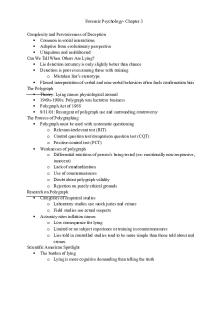Chapter 1 - Summary Forensic Psychology PDF

| Title | Chapter 1 - Summary Forensic Psychology |
|---|---|
| Author | Lynton Lam |
| Course | The Psychology of Crime and Punishment |
| Institution | The University of Western Ontario |
| Pages | 1 |
| File Size | 49.4 KB |
| File Type | |
| Total Downloads | 3 |
| Total Views | 182 |
Summary
Chapter summary...
Description
Chapter 1 Learning Objectives • • • • •
Identify major milestones in forensic psychology Provide narrow and broad definitions of forensic psychology Describe the differences between clinical and experimental forensic psychology List three ways psychology and law interact List criteria for expert testimony in Canada
Chapter 1 Summary 1. The history of forensic psychology is marked by many important milestones, in both the research laboratory and the courtroom. Early research included studies of testimony and suggestibility, and some of the early court cases in Europe where psychologists appeared as experts dealt with similar issues. Hugo Munsterberg played a significant role in establishing the field of forensic psychology in North America, and by the early 1900s, forensic psychologists were active in many different parts of the North American criminal justice system, including in Canada. Currently, forensic psychology is viewed as a distinct and specialized discipline, with its own textbooks, journals, educational programs, and professional associations. 2. Forensic psychology can be defined in a narrow or broad fashion. Narrow definitions usually focus only on the clinical or experimental aspects of the field, whereas broad definitions are less restrictive and encompass both aspects. 3. Forensic psychologists can play different roles. Clinical forensic psychologists are primarily interested in mental health issues as they pertain to law. Experimental forensic psychologists are interested in studying any aspect of human behaviour that relates to the law (e.g., eyewitness memory, jury decision making, risk assessment). 4. Psychology can relate to the field of law in three ways. Psychology and the law refers to the use of psychology to study the operation of the legal system. Psychology in the law refers to the use of psychology within the legal system as it operates. Psychology of the law refers to the use of psychology to study the legal system itself. 5. Expert witnesses differ from regular witnesses in that expert witnesses can testify about their opinions, whereas other witnesses can testify only as to what they know to be fact. In Canada, the criteria for determining whether an expert’s testimony will be admitted into court relate to whether the testimony (1) is relevant, (2) goes beyond the common understanding of the court, (3) does not violate any exclusionary rules, and (4) comes from a qualified expert....
Similar Free PDFs

Forensic Psychology Chapter 3
- 3 Pages

Forensic Psychology Chapter 4
- 4 Pages

Forensic Psychology Lecture 1
- 7 Pages

Forensic Psychology
- 4 Pages

Forensic psychology modules
- 17 Pages

Historyof Forensic Psychology
- 10 Pages

2 Forensic Psychology Notes
- 45 Pages

Forensic Psychology - Lecture 22
- 4 Pages

Forensic Psychology- Content Unit
- 66 Pages

Forensic Psychology Lecture Notes
- 78 Pages
Popular Institutions
- Tinajero National High School - Annex
- Politeknik Caltex Riau
- Yokohama City University
- SGT University
- University of Al-Qadisiyah
- Divine Word College of Vigan
- Techniek College Rotterdam
- Universidade de Santiago
- Universiti Teknologi MARA Cawangan Johor Kampus Pasir Gudang
- Poltekkes Kemenkes Yogyakarta
- Baguio City National High School
- Colegio san marcos
- preparatoria uno
- Centro de Bachillerato Tecnológico Industrial y de Servicios No. 107
- Dalian Maritime University
- Quang Trung Secondary School
- Colegio Tecnológico en Informática
- Corporación Regional de Educación Superior
- Grupo CEDVA
- Dar Al Uloom University
- Centro de Estudios Preuniversitarios de la Universidad Nacional de Ingeniería
- 上智大学
- Aakash International School, Nuna Majara
- San Felipe Neri Catholic School
- Kang Chiao International School - New Taipei City
- Misamis Occidental National High School
- Institución Educativa Escuela Normal Juan Ladrilleros
- Kolehiyo ng Pantukan
- Batanes State College
- Instituto Continental
- Sekolah Menengah Kejuruan Kesehatan Kaltara (Tarakan)
- Colegio de La Inmaculada Concepcion - Cebu





